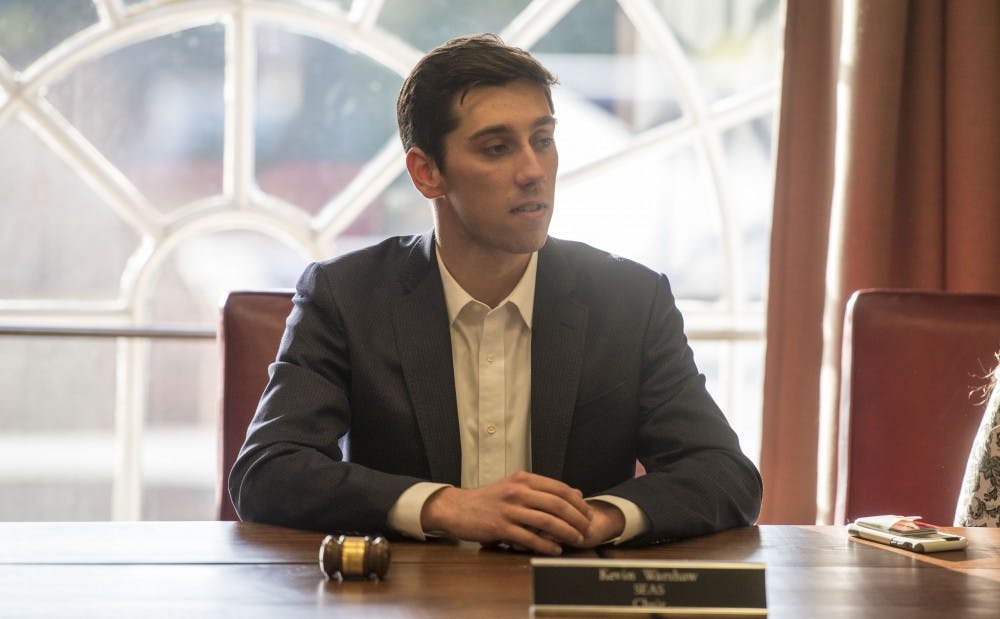The University Judiciary Committee hosted University Board of Elections chair and fourth-year College student Alex Smith-Scales in preparation for the upcoming spring general election during their first meeting of the semester Sunday evening.
UJC Chair and fourth-year Engineering student Kevin Warshaw reflected on his own election experience as the committee prepares for the new cohort of representatives.
“Whenever I ran for office, I ran on a combination of experience and passion for making this a better community and better committee,” Warshaw said.
UJC membership consists of representatives, support officers and the First Year Judiciary Committee sub-committee. Support officers — counselors, investigators and educators — are appointed positions obtained through an application process. Likewise, FYJC judges are first-years who have been interviewed and selected for the position by the UJC Vice Chair for First Years. Only representatives are elected, and UJC members are eligible to run for the election.
Smith-Scales talked about campaign rules and regulations of elections procedures and said the most common violations typically pertain to flyer size and chalking limitations.
“[UBE determines] the eligibility of candidates to appear on the ballot, so unresolved violations that go against University policies and regulations may be reported to UJC and Honor,” Smith-Scales said.
Twenty-five UJC representatives are elected to a one-year term starting April 1. During the term, the representative will attend biweekly UJC meetings and may serve as a judge in UJC trials. There are two officials representing each academic school — except for the College, for which there are three.
The window to register for candidacy and apply for campaign grants opens 10 a.m. Jan. 28 and ends 4 p.m. Feb. 1. Candidates for UJC representative are not required to have petition signatures but may interview for endorsements from University organizations. The campaigning period runs from 10 a.m. Feb. 21 until the end of voting, which occurs 10 a.m. Feb. 26 through 4 p.m. Mar. 1.
Although candidates may apply for specific need-based campaign grants — UJC Representative candidates for the College and School of Engineering may apply for a “Tier 2” grant of $100 or a “Tier 3” grant of $75, respectively — and must report their expenses, Smith-Scales noted that there is no limit to campaign spending.
The highest grant is the Tier 1 grant of $150 for student council president and decreases with each tier. Tier 2 is for Student Council vice president for organizations, Student Council vice president for administration and College representatives from the Honor Committee, Student Council and UJC.
Similarly, Tier 3 is for Engineering representatives from the Honor Committee, Student Council and UJC as well as College council and class councils and their trustees. Tier 4, which offers a $50 grant, is designated for non-College or Engineering Honor, UJC or Student Council representatives and councils from Commerce, Architecture, Curry, Engineering and Nursing.
“There is no spending limit — last year there was a petition for endorsing [organizations] that if a candidate were to go over these spending limits, then they would not endorse them,” Smith-Scales said. “That was completely independent of UBE. We were not in charge of that.”
UJC representatives are elected in what Smith-Scales described as a first-past-the-post or “select candidates” election for multiple-runner races. Unlike instant-runoff voting, voters do not rank candidates in order of preference, but rather select multiple candidates that they’d prefer to see elected based on the number of open seats.
Candidates’ responses to UBE’s Candidate Nomination Form appear on the ballot, which includes questions about qualifications and goals for the position. The candidate’s expenditure report is also made available to the voting population through UBE’s website.
“We want to keep this election fair, and we also want to keep it transparent,” Smith-Scales said.
Warshaw recalled that inclusivity was an important aspect of his past campaign platform.
“Throughout my involvements on UJC, you’re able to identify areas where there’s room for improvement — that just comes with serving on the committee for a number of years,” Warshaw said. “One in this most recent election where I felt like we could be doing better is outreaching to the community, and specifically generally underrepresented communities, so that was a main pillar of my campaign.”
In 2018, Warshaw formed a Diversity and Engagement Committee to connect with students on Grounds from different backgrounds and required all UJC members to partake in training seminars for bias and Green Dot training on personal violence.
However, UJC’s internal demographic makeup for Fall 2018 — compared to the overall University demographic — underrepresented Hispanic Americans, Native Americans, Pacific Islanders and international students. The survey that was conducted represents 75 out of 97 UJC members.





